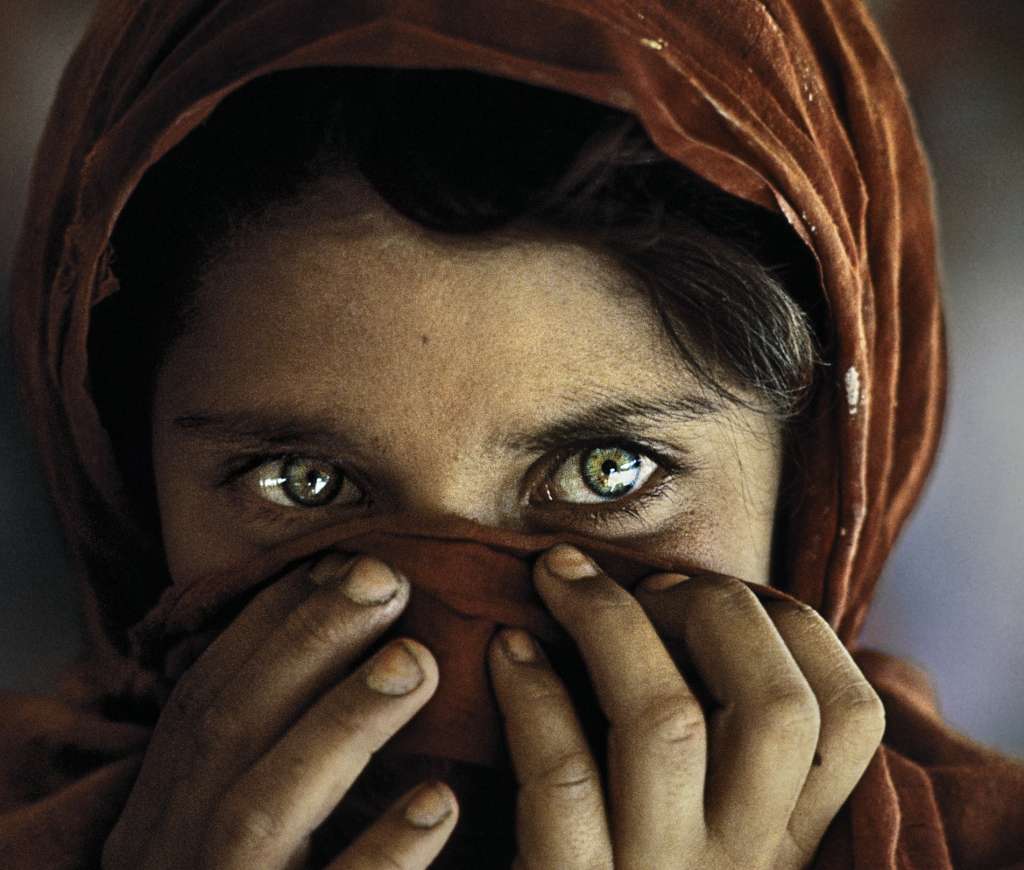A photo has been taken in a Nasir Bagh refugee camp in Pakistan for a little Pashtun girl, who is escaping war in Afghanistan to Pakistan. Born 20 March 1972, Sharbat Gula with her piercing green eyes which made her an icon. Orphaned at age of six during the Soviet invasion of Afghanistan. She walked with her siblings to Pakistan along with her grandmother. She became the symbol of refugees, and now she is the symbol of returnees, after decades away.
The photo has been taken by Photographer Steve McCurry’s in 1984, and it appeared on the June 1985 cover of National Geographic, The image is of an adolescent girl with green eyes in a red headscarf looking intensely at the camera never been identified, The image of her face, with a red scarf draped loosely over her head and her eyes staring directly into the camera, was named “the most recognized photograph” in the magazine’s history, and the cover is one of National Geographic’s most famous American Photo magazine says the image has an “unusual combination of grittiness and glamour.
McCurry made several unsuccessful attempts during the 1990s to find her, In January 2002, a National Geographic team traveled to Afghanistan to find her. Upon learning that the Nasir Bagh refugee camp was soon to close, McCurry inquired of its remaining residents, one of whom knew Sharbat Gula’s brother and was able to send word to her hometown. But several women falsely identified themselves as the famous Afghan Girl. In addition, after being shown the 1984 photo, several young men erroneously identified her as their wife.

The team found Sharbat Gula, then around age 30, in a remote region of Afghanistan; she had returned to her native country from the refugee camp in 1992. Her identity was confirmed by John Daugman using iris recognition. She recalled being photographed. She had been photographed on only three occasions: in 1984 and during the search for her when a National Geographic producer took the identifying pictures that led to the reunion with McCurry. She had never seen Afghan Girl until it was shown to her in 2002.
Between the fleeing from war to the refugee camp for decades and the return to Afghanistan, the journey wasn’t easy and didn’t end at those two points: fleeing and return.
Sharbat Gula was arrested for using a forged Pakistani identity card—a common practice among the 1 million Afghan refugees who live in the country without legal status. She faced up to 14 years in prison and a $5,000 fine. At the time, she was raising three children and was suffering from hepatitis C, which killed her husband years earlier. When Pakistan arrested her and accused her of having a fake Pakistan ID it became a national cause for Afghans and the Afghan government.
After being detained for two weeks Sharbat Gula was released and returned to Afghanistan with her children. “Afghanistan is only my birthplace, but Pakistan was my homeland and I always considered it as my own country,” she told AFP before leaving. “I am dejected. I have no other option but to leave.
In 2016 alone, 370,000 registered refugees returned from Pakistan to Afghanistan. And another ten of thousands more have been sent back to their homeland from Iran and Europe in recent years, often by coercion or deportation. An untold number of unregistered refugees—like Sharbat Gula—have returned as well.
She told McCurry at the time that she hoped her daughters could have the education she never had. Now they will. Her daughters are enrolled in school. The Afghan government saw the influence of Gula on the Afghani community, and the government is encouraging her to expand that dream by launching a foundation to educate and empower women and children, particularly those being repatriated, She said once to the BBC Persia “My message to all my sisters is not to marry their daughters at a young age, Let them finish their education the same as your sons do.” Today, only half of the Afghan girls attend school and the majority of those who do drop out between the ages of 12 to 15. In rural areas, the number of girls in school is now declining.
There is another side along with this story, told by the Human Rights Watch staff Barr says that gender equality in Afghanistan lags behind Pakistan and Iran, which took in a combined six million Afghan refugees during the Soviet War. Women and girls returning to Afghanistan must adapt to having a male companion escort them out of the house or make decisions for them. Sometimes, she says, these returnees are “perceived as immoral or indecent” because they grew up abroad.

“While Sharbat Gula was granted a warm welcome upon her arrival back in Afghanistan, thousands of other Afghan women are being forcibly returned without any family, home, job, or possibility for a secure, stable life,” Barr said.
While we are writing this story, the women in Afghanistan are going back to the fear and abuse by the Taliban again, after the US withdraws from the country and the whole country rapidly falls in their hand’s city by city with no time. The world should stand altogether to save them from a dark future especially for the young generation, the story of Sharbat should not be repeated, peace, education, housing, health care, life with no fear should be granted to all humanity,